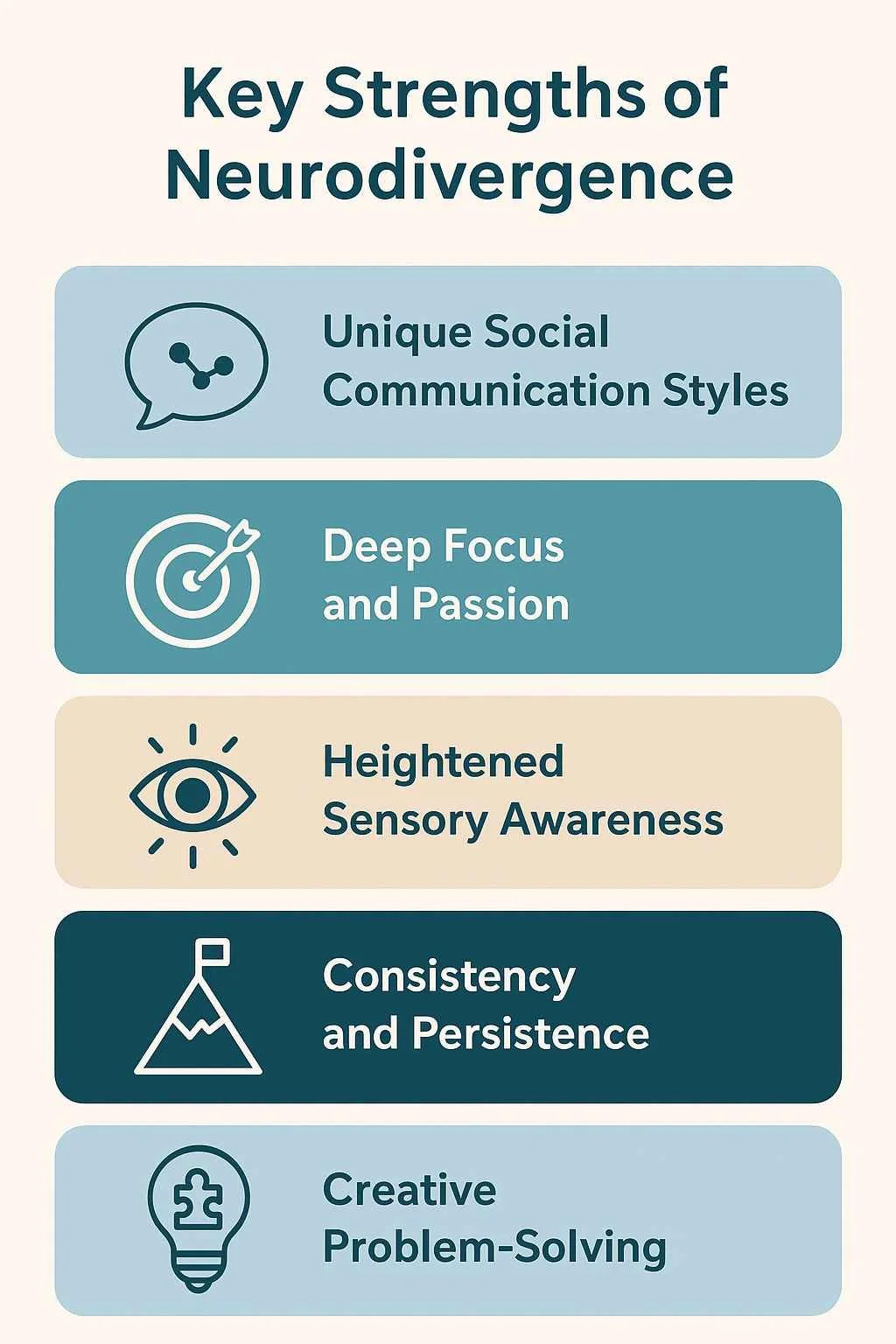Key Signs of Neurodivergence in Adults and What to Do
Many adults live their daily lives sensing that their brain works differently, but may not realize these differences point to neurodivergence. Some people communicate in unique ways, approach tasks with nontraditional methods, or experience the world more vividly through their senses.
Recognizing these signs of neurodivergence can help people celebrate how their minds work, build self-understanding, and access strategies that support their growth.
Key Takeaways
Neurodivergence describes natural variations in brain function that shape how people think, feel, and communicate.
Differences may include distinct social communication styles, unique ways of focusing, or heightened sensory awareness.
Many neurodivergent people have strengths such as deep focus, pattern recognition, and creative problem-solving.
Support from professionals can help highlight these strengths and provide tools for handling daily life with confidence.
What Does Neurodivergence Mean for Brain Function?
Common Signs of Neurodivergence in Adults
Why Adults May Miss Signs of Neurodivergence
What to Do if You Notice Signs of Neurodivergence
Frequently Asked Questions About Neurodivergence in Adults
How Connected Speech Pathology Can Help a Neurodivergent Person
What Does Neurodivergence Mean for Brain Function?
Neurodivergence is an umbrella term for people whose brains process information differently from what is considered typical. These differences may be connected to autism, ADHD, learning differences, or may exist without any related condition.
A neurodivergent person may experience the world through unique perspectives. They may process information, engage in interactions, and respond to sensory input in ways that enrich our collective human experience.
Common Signs of Neurodivergence in Adults
Different Ways of Connecting
Neurodivergent adults often approach social interactions differently. Some may prefer less eye contact, interpret language literally, or value direct communication. Others may notice social cues in unique ways, sometimes finding them more challenging to read, sometimes spotting patterns that others miss.
These differences highlight human diversity in how people connect and describe people, bringing honesty, clarity, and refreshing perspectives to conversations.
Unique Attention Styles
Attention can look different for neurodivergent people. Some may find it harder to shift between tasks or tune out distractions, while others can immerse deeply in areas of interest. This ability to focus intensely often fuels innovative thinking and creative thinking, offering new perspectives that drive problem-solving and help people see the world differently.
Experiencing the World More Vividly
Sensory processing differences shape how many neurodivergent adults experience the world. Some individuals may be particularly sensitive to sensory stimuli, such as sounds, lights, or textures, while others may notice them with less intensity.
This variation can sometimes cause sensory overload, but it also enriches perception and fosters a strong appreciation for detail in everyday life.
The Value of Repetition and Routine
Repetitive movements, focused interests, or consistent routines can provide comfort, regulation, and stability. What may look rigid to others often helps neurodivergent adults manage energy and complete certain tasks more efficiently. These patterns also support persistence, reliability, and mastery of skills.
Cognitive Differences and Diverse Thinking
Neurodivergence shapes how people process information, organize thoughts, and express themselves. Some individuals may experience learning difficulties or differences in memory, reading, or organization.
At the same time, these cognitive differences often bring unique strengths such as pattern recognition, creative thinking, and the ability to approach certain tasks in ways that offer new perspectives and deepen our understanding of human diversity.
Well-being and Self-Acceptance
Many neurodivergent adults experience stress or anxiety, not because of who they are, but because of pressure to fit into societal norms. Building self-understanding, celebrating strengths, and accessing supportive environments can improve well-being and help people thrive while staying true to themselves.
Why Adults May Miss Signs of Neurodivergence
Many neurodivergent individuals adapt to societal standards in young adulthood, which can mask the signs.
For example, a person may force themselves to maintain eye contact or hide repetitive behaviors to fit in socially. While these adaptations can help them handle certain environments, over time, they may also lead to fatigue, stress, and impacts on well-being.
Recognizing that these coping strategies are often learned for survival, not because the person is “less neurodivergent,” can help bring greater understanding and compassion.
What to Do if You Notice Signs of Neurodivergence
The first step is to recognize that neurological differences are natural variations in the human brain. If these differences affect everyday life, such as finding social interactions exhausting, struggling with group conversations, or feeling anxious about dating or making new friends, building awareness and considering professional support can be helpful.
While “neurodivergence” itself is not a diagnosis, conditions such as autism, ADHD, or learning differences can be formally identified by a qualified health professional.
An evaluation or screening can connect adults to resources, coping strategies, and supportive environments that highlight strengths.
Working with professionals such as speech-language pathologists can also provide practical tools for situations like participating in workplace meetings, preparing for interviews, building confidence in dating, or managing sensory stimuli in busy environments. These supports make everyday life smoother while allowing adults to stay authentic to themselves.
Try This Reflective Neurodivergent Quiz
Wondering if you’re neurodivergent? Try our quiz!
Frequently Asked Questions About Neurodivergence in Adults
1. What are the most common signs of neurodivergence in adults?
Common signs include sensory sensitivities, unique attention styles, and differences in social communication. Some adults may rely on routines, show repetitive behaviors, or develop an intense focus on specific interests. These traits reflect natural variations in brain function and often come with strengths such as creativity, innovative thinking, and fresh perspectives.
2. How do I know if I need a professional evaluation?
A professional evaluation can be helpful if differences in focus, social interaction, or sensory experiences are making daily life more stressful or difficult. A health professional can clarify whether autism, ADHD, or another condition is present and can recommend strategies, accommodations, and resources to adapt to different learning styles.
Even without a formal diagnosis, seeking support can improve confidence and quality of life.
3. Can adults develop neurodivergence later in life?
Neurological differences do not originate in adulthood. It is part of how the brain develops. However, signs may become more noticeable later in life when responsibilities increase or environments change.
Many people recognize their neurodivergence only as adults, especially when school settings, work, or relationships highlight differences in attention, communication, or sensory processing.
4. What is the difference between autism spectrum disorder (ASD) and attention-deficit hyperactivity disorder (ADHD)?
Autism spectrum disorder (ASD) is often associated with social communication differences, sensory sensitivities, and a preference for routines or repetitive behaviors. Attention-deficit/hyperactivity disorder (ADHD) is linked to unique attention patterns, impulsivity, difficulty focusing on certain tasks, and challenges with task completion. Both are forms of neurodivergence, and some adults experience traits of both.
5. How can neurodivergent people manage sensory overload?
Neurodivergent people can manage sensory overload by using coping strategies such as noise-canceling headphones, breaks from visual stimuli, or creating quiet spaces. Identifying triggers, such as loud noises or bright lights, can also help reduce stress.
Support from professionals and adjustments in the work environment can improve daily life.
How Connected Speech Pathology Can Help a Neurodivergent Person
Connected Speech Pathology provides personalized online speech-language services to help neurodivergent adults thrive.
Our speech-language pathologists celebrate the strengths of neurodivergence while offering practical strategies for areas that feel more challenging.
We help adults strengthen social communication, build tools for dealing with sensory stimuli, and develop confidence in both personal and professional settings. Because sessions are online, support is flexible and accessible from home, the workplace, or wherever it feels most comfortable.
Summary
Signs of neurodivergence in adults often appear in social interactions, sensory experiences, attention styles, and routines. These variations reflect the diversity of the human brain and are not flaws to be hidden.
Recognizing and embracing these differences can reduce stress, improve wellbeing, and strengthen relationships. With the right support, many adults discover strategies that highlight their strengths, make daily life smoother, and open doors to new opportunities.
About the Author
Allison Geller is a communication coach, speech-language pathologist, and founder of Connected Speech Pathology, an international online practice providing professional communication coaching and speech therapy for children, teens, and adults. With more than two decades of experience, she has worked in medical and educational settings, published research on aphasia, and leads a team of specialists helping clients improve skills in public speaking, vocal presence, accent clarity, articulation, language, fluency, and interpersonal communication.









